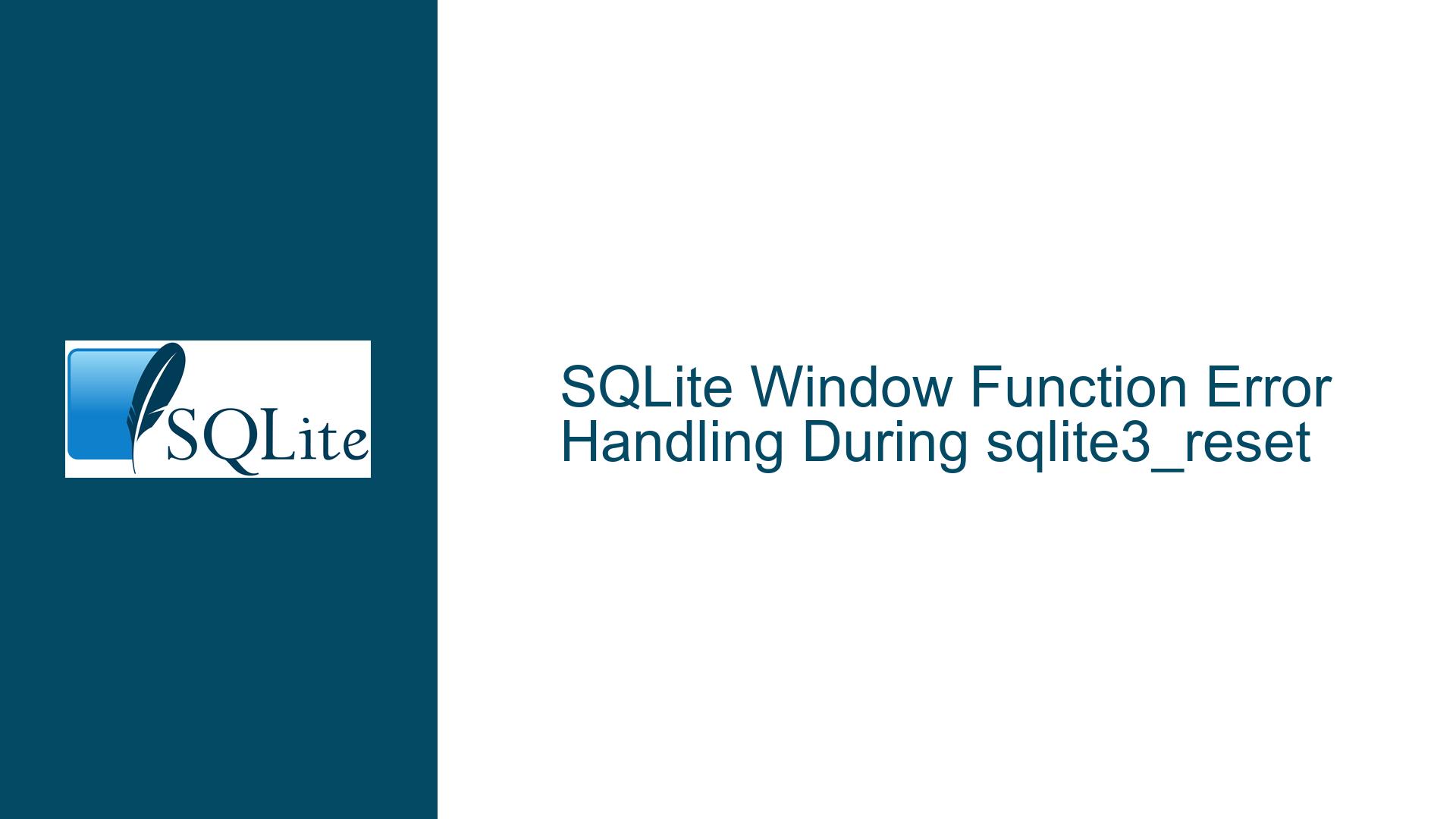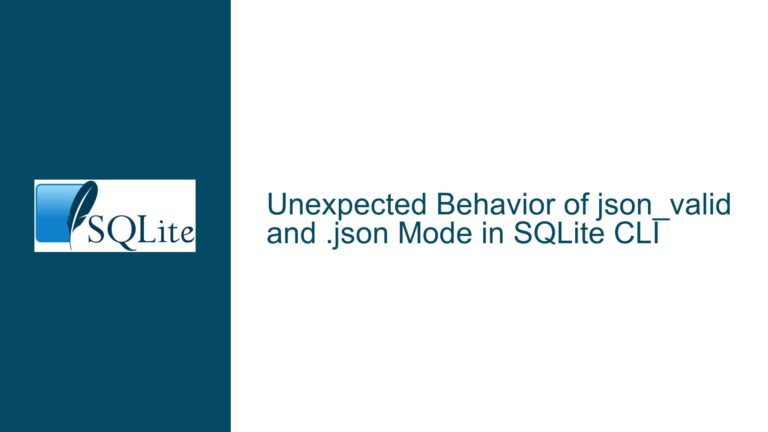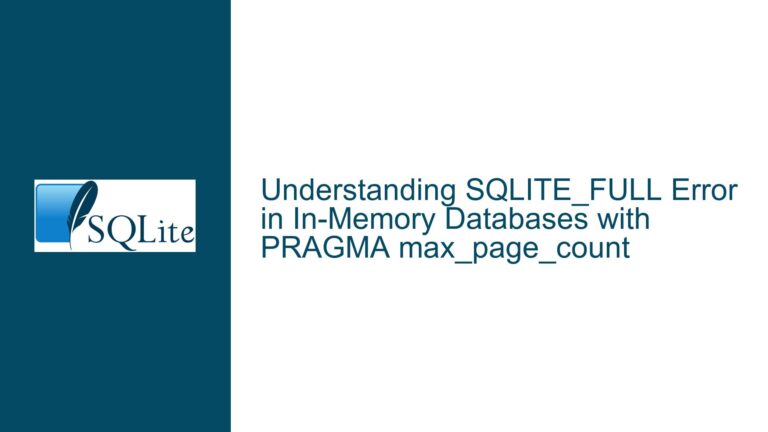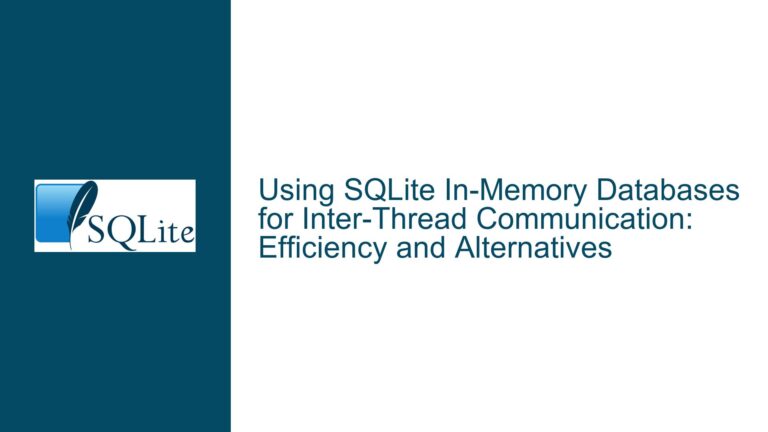SQLite Window Function Error Handling During sqlite3_reset
Understanding the Behavior of sqlite3_reset with Window Function Errors
When working with SQLite, particularly in scenarios involving window functions, understanding the behavior of sqlite3_reset is crucial. The sqlite3_reset function is used to reset a prepared statement object back to its initial state, allowing it to be re-executed. However, a nuanced issue arises when a window function’s finalization method (xFinal) encounters an error during this reset process. Specifically, the error reported by sqlite3_result_error within the xFinal method is not propagated back to the caller of sqlite3_reset. Instead, sqlite3_reset returns SQLITE_OK, indicating success, even though an error occurred during the finalization phase.
This behavior can be perplexing, especially for developers who expect all errors to be reported consistently. The core of the issue lies in the timing and context of the error. When sqlite3_reset is called, the query is being abandoned, and the system is in the process of cleaning up resources. During this cleanup, the xFinal method of the window function is invoked to perform any necessary finalization tasks. If an error occurs during this finalization, it is essentially a "destructor" context, where the primary operation (the query execution) has already been terminated. The error, therefore, is not considered critical to the ongoing operation, and SQLite chooses to swallow it rather than propagate it back to the caller.
The Implications of Ignoring Errors in Destructor Contexts
The decision to ignore errors during the finalization phase of a window function when sqlite3_reset is called has several implications. First, it aligns with the general programming principle that destructors should not throw exceptions or report errors. This principle is rooted in the idea that destructors are responsible for cleaning up resources, and any errors during this process could lead to resource leaks or other undefined behavior. In the context of SQLite, this means that errors occurring during the xFinal method of a window function are treated as non-critical and are not propagated back to the caller.
However, this behavior can be problematic for developers who rely on consistent error reporting. In many cases, errors, even those occurring during cleanup, are important for diagnosing issues or ensuring data integrity. For example, if a window function’s xFinal method encounters an error while writing to a log or performing some other critical operation, the developer might want to know about this error to take corrective action. By swallowing the error, SQLite makes it difficult for developers to detect and respond to such issues.
Moreover, this behavior can lead to confusion during debugging. If a developer is unaware that errors during xFinal are ignored, they might spend considerable time trying to figure out why an error is not being reported, even though it is being set using sqlite3_result_error. This can be particularly frustrating in complex codebases where the interaction between different components is not immediately apparent.
Strategies for Handling Errors in Window Function Finalization
Given that SQLite does not propagate errors from the xFinal method during sqlite3_reset, developers need to adopt alternative strategies to handle such errors effectively. One approach is to implement additional logging or error tracking mechanisms within the xFinal method itself. For example, if an error occurs, the method could write the error details to a log file or set a flag in a global error tracking system. This way, even though the error is not propagated back to the caller, it is still recorded and can be reviewed later.
Another strategy is to avoid performing operations that could fail within the xFinal method. If possible, the finalization process should be limited to non-critical tasks that are unlikely to encounter errors. For example, if the xFinal method is responsible for releasing resources, it should ensure that these resources are always in a valid state before attempting to release them. This reduces the likelihood of errors occurring during finalization and minimizes the need for error handling in this context.
In cases where it is necessary to perform potentially error-prone operations during finalization, developers can consider using a two-phase approach. In the first phase, the operation is performed and any errors are handled before the finalization process begins. In the second phase, the finalization is performed, but only after ensuring that all potential errors have been addressed. This approach ensures that errors are detected and handled before the finalization process, reducing the risk of errors occurring during the xFinal method.
Best Practices for Using sqlite3_reset with Window Functions
To avoid issues related to error handling during sqlite3_reset, developers should follow several best practices when working with window functions in SQLite. First, it is important to understand the lifecycle of a prepared statement and the role of sqlite3_reset in this lifecycle. When a prepared statement is executed using sqlite3_step, it progresses through several states, including SQLITE_ROW and SQLITE_DONE. Once the statement has been executed, sqlite3_reset is used to return it to its initial state, allowing it to be re-executed.
During this reset process, any window functions associated with the statement will have their xFinal methods called to perform finalization tasks. Developers should be aware that errors occurring during this phase will not be propagated back to the caller of sqlite3_reset. Therefore, it is important to ensure that the xFinal method is implemented in a way that minimizes the risk of errors. This includes avoiding complex or error-prone operations within the xFinal method and using alternative mechanisms to handle any errors that do occur.
Another best practice is to use SQLite’s logging capabilities to track errors that occur during the finalization process. While SQLite does not automatically log errors from the xFinal method, developers can implement custom logging within the method to record any errors that occur. This can be particularly useful for debugging and diagnosing issues that arise during the finalization phase.
Finally, developers should consider the broader context in which sqlite3_reset is used. In many cases, the decision to reset a prepared statement is part of a larger workflow that involves multiple steps and potential error conditions. By understanding the implications of sqlite3_reset on error handling, developers can design their workflows to account for the possibility of errors during finalization and ensure that these errors are handled appropriately.
Conclusion
The behavior of sqlite3_reset in relation to window function errors is a nuanced aspect of SQLite that can have significant implications for developers. By understanding the reasons behind this behavior and adopting appropriate strategies for handling errors, developers can ensure that their applications are robust and reliable. While SQLite’s decision to swallow errors during the finalization phase may seem counterintuitive, it is consistent with broader programming principles and can be managed effectively with the right approach. By following best practices and implementing additional error tracking mechanisms, developers can mitigate the risks associated with this behavior and ensure that their applications handle errors consistently and effectively.






